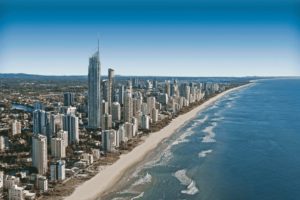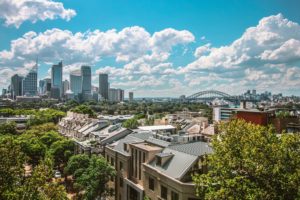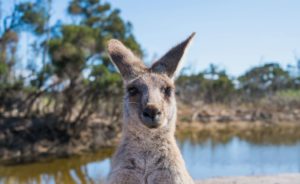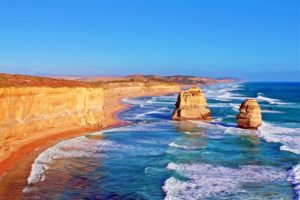Australia is a great place to live. That’s not just an opinion, either – according to a United Nations report, it’s ranked second in the world for quality of life, and it’s one of the most prosperous nations on earth.
Australia is made up of the mainland – the biggest island in the world – plus many smaller islands, including Tasmania. People mainly live in the coastal regions, with around 85% living within 50km of the coast. The eastern seaboard is the most heavily populated. However, with around 21,000 miles of coastline to choose from, nowhere is overcrowded.
The country is divided into territories, or states, and has eight capital cities. Canberra is the national capital of Australia. The three biggest cities are Sydney, Melbourne and Brisbane, and they – and Canberra – are situated in the popular eastern states.
Australia has a population of around 24.5 million people, 1.3 million of whom are British expatriates. It’s the most popular destination for Brits looking to emigrate. As well as people relocating to Australia, drawn by the climate, the easy-going lifestyle and the friendly welcome they receive, many go to travel or to study.
Australia is a big country and has multiple time zones – you can find yourself anywhere from 8 to 11 hours ahead of Greenwich Mean Time (GMT). The currency is the Australian dollar, and if you need to contact anyone to make arrangements or enquiries prior to your move, the dialling code is +61. The language spoken is English.

Climate
Despite Australia having several different climate zones you can, for the most part, enjoy warm weather pretty much all year round.
Broadly speaking, the north has a more tropical climate, with hot, humid summers and warm, dry winters. Tropical cyclones, which typically occur between December and April, can bring heavy rain and strong winds.
The south is cooler, giving mild summers and cool, sometimes rainy, winters. Snow may be found in the highland areas and there is even ski tourism in those areas like Mount Buller and Thredbo that have a regular snow season.
The interior is arid to semi-arid, and can be subject to dust or sandstorms.
Culture
The Australian way of life centres around the outdoors, which is understandable bearing in mind the pleasant climate, usually dependable weather, stunning beaches and beautiful natural landscapes. There’s a lot of space, plenty of room to have fun in.
Although Aussies can be direct, they also value being polite and treating people fairly, which can temper the approach. They’re competitive, so if you get involved in a game of beach volleyball, expect them to play to win!
Family is important, as are friends, and society also tends to be egalitarian. People are friendly, so expect strangers to strike up a conversation on public transport.

Visa
You will need a visa to visit or relocate to Australia. The country operates a strict points-based immigration system which dictates the type of visa you may be awarded. If you want to become a permanent resident, the most common include:
Family-stream permanent residence visas, for partners and relatives of an existing Australian citizen.
Work-stream permanent residence visas, for people who have valued skills or are sponsored by an Australian employer.
Business or investment-stream permanent residence visas, for people looking to start a business or invest.
The Australian government provides comprehensive information to help you navigate the system.
Jobs
Getting a job in Australia is, for many people, tied into the process of getting a visa and being eligible to move there in the first place. The main industries include education, mining, media and agriculture, so there’s a broad range of opportunities to pursue.
First, make sure your CV is up to date and in the style expected by Australian employers. If you’re used to the standard two-page UK-style CV you may have to add some detail as, for more experienced employees, three to four pages is common.
It’s possible to start your job search from the UK via online jobs boards. Do your research first as you’ll want an employer who will sponsor you to allow you to get your visa.
It’s not unheard of for interviews to be conducted via Skype, but bear in mind the time difference and be prepared to be interviewed during the night.
Once you do get a job, you’ll find that the culture isn’t one that places work above all else. Yes, work is valued, but so is a good work-life balance.
Cost of living
Living in Australia is expensive. Groceries, consumer goods, rent and property will all cost more than they do in the UK. However, the wages are also higher, so if you will be working it should balance out.
If you will be living on, for example, savings or a pension, then you need to take the cost of living into account when you are calculating your budget.

Renting or buying a property
If you’re looking to rent, be aware that the rental market moves swiftly, especially in major cities. Also, expect to pay more than you would for a similar property in the UK.
You can start your search online, then apply to the relevant rental agent. They prioritise applications in the order they’re received. Expect to have to supply proof of identity and income, rental payment history (if available), references, and visa. There’ll generally be an open house or viewing event, so you can check the place out.
If you go ahead with the rental, you’ll need to sign a lease and pay both a bond and the first month’s rent. There’s a tenants’ association to help renters in each state, so make sure you know where yours is, just in case.
If you want to buy, it’s a good idea to use an estate agent. Offering up to ten per cent less than the asking price is common, and a professional will help you to know what’s a fair offer.
It’s also a good idea to approach the bank and get a mortgage in principle, so you know how much you have to spend and can prove to sellers you can afford the property. These aren’t a guarantee of a mortgage, so you’ll still have to make a formal application when you find somewhere to buy. You’ll also need to have searches and a survey carried out.
Bear in mind if you pay fees from a UK bank account it will likely cost you more, due to transfer fees and the exchange rate offered.
Pets
If you’re planning to take your pets with you to Australia, you’ll need to start planning well in advance.
Pets from the UK will have to spend a minimum of ten days in quarantine, and there might be a wait for them to be admitted, so get booked up as soon as you can. There’s only one facility, in Melbourne, so your pet must travel to Melbourne International Airport, irrespective of where you are planning to live.
Pets need to be vaccinated against rabies and then tested for rabies 30 days after the vaccination. They also need to be microchipped. You’ll have to apply for an import permit for each pet, which can be done online.
Your vet can help you with all the necessary paperwork and help make sure general vaccinations and parasite treatments are also up to date.

Bank account
Opening a bank account in Australia is pretty straightforward. As in the UK, you will be required to provide documentation such as a utility bill or bank statement, passport and/or driving licence. Unlike the UK, however, each document is allocated a points score, and you have to provide documentation that totals 100 points or more.
That’s not as tricky as it might sound; your birth certificate, passport, or citizenship certificate, if you have one, scores you an immediate 70 points, so you’re almost there. Add your driving licence (40 points) and you’re over the line. If you don’t have a driving licence, then a utility bill, bank statement or credit card can contribute 25 points each.
If you want to get organised in advance, the main banks allow you to open an account online, so you can do it before you leave the UK. In that case, however, you can only use your account for deposits, not withdrawals – you’ll be able to withdraw money once you’re in the country and have provided your local branch with the necessary documentation.
Education
The education system in Australia is world-class, and the system is comparable to the UK. State education is free and there’s a big focus on sports. The school year runs from January to December.
If you want to go to university in Australia, the fees can be quite high – higher than in the UK. Applications should be made direct to your university of choice. To qualify for a student visa, you’ll need enough money in your bank account to cover both your year’s study and living expenses, and you must also have a return plane ticket.
Healthcare
The national Australian healthcare system – Medicare – is among the best in the world. It’s available to all citizens and permanent residents. It’s a mix of free care (for inpatients) and part-funded (for primary care, such as seeing your GP). In the case of the latter, 75% of charges are generally covered, and most people take out ‘top-up’ private health insurance to cover the balance.
When you move to Australia, make sure you are covered by Medicare, and/or take out private health insurance.
Driving
Australians drive on the left, same as in the UK. However, they use the metric system for speed and distance. You can drive with an English licence for up to three months, but you’ll need to replace it within that time with a licence from an Australian state.
Seat belts must be worn and children and infants need to be restrained using approved seats or harnesses. It’s up to the driver to make sure everyone complies with seatbelt laws and people are fined for transgressions.

Transportation
Moving abroad to Australia is a big undertaking. You have to arrange transportation for everything, including your car. If you’re packing up your entire home, you can get an exclusive service where only your goods are shipped in one container. If you aren’t taking so much, then it will be more cost-effective to share a container with others. The first option gives you more control over the delivery date, but is more expensive. With the second, the container will ship when it is full, so you might have to be patient.
Whichever option you choose, take care to pick a company with experience of overseas removals. As well as needing to be expertly packed – those seas can be rough – you need to be confident you have the correct customs paperwork to allow your belongings into Australia.
Ask for a detailed written quotation and make sure your goods are adequately insured.
Our friendly, family business has been running for over twenty years and can help with your relocation to Australia, or any other international or European destination. Our expert team can handle the logistics, leaving you free to enjoy the adventure. TFM are fully-insured, and members of BAR (British Association of Removers).
In addition to a comprehensive worldwide removals service, we can provide both long-term and short-term storage solutions. Contact us today for a quotation or more information on how we can help.



 Small
Small







